If you’ve been thinking about going back to school to become a teacher, the fact that early childhood education is one of the 50 highest paying master’s degrees might be highly encouraging. However, many older students, especially those who are interested in changing careers entirely rather than pivoting their career path only slightly, may worry that they are too old to get accepted into such a program. Fortunately, the student population of colleges and especially graduate schools today is more varied than ever, and you can even opt for a program designed specifically for adult learners or career changers.
IMAGE SOURCE: Pixabay, public domain
The Acceptance of Nontraditional Students in Colleges and Grad Schools
In colleges and universities across the United States, the student body is increasingly becoming less traditional. Whereas undergraduate students who didn’t enroll in college immediately after finishing high school once stuck out like a sore thumb, around 40 percent of the college population now qualify as “nontraditional students.” Some measures place this figure at closer to 70 percent, according to the National Center for Education Statistics. If nontraditional students are becoming more widely accepted among undergraduates, this trend is even more pronounced at the graduate level, where even the youngest students aren’t starting until at least their early- to mid-twenties.
Sure, you may have in your class or cohort students in their early twenties who are fresh out of college with a bachelor’s degree in education. Often, these students don’t yet have a lot of experience, other than their student-teaching semester of their undergraduate coursework. They usually opt to pursue a master’s degree at this stage in their career because they realize that getting back into the student mindset after years out of school is challenging, especially if they also have family obligations to manage.
However, many of your classmates in a graduate program in early childhood education may be closer to your age than you would expect. Some are experienced educators who already have a teaching certification, although this student population is more likely to be pursuing a degree in educational leadership. Other students are likely to be career changers like you. They may come to the field with a little or a lot of work experience outside the field of education.
One of the biggest challenges for adult graduate students pursuing a master’s degree in early childhood education is student-teaching, a semester-long full-time field experience that requires so much time and focus that the student-teacher usually isn’t able to work.
Master’s Degree Programs for Adult Learners and Career Switchers
If you feel self-conscious about your age or you think you would learn better surrounded by peers closer to your age, you could always look into a program designed specifically for adult learners. Just as young children have unique educational needs, so do adult learners. These programs tailor instruction to fit the learning styles and busy schedules of adult students who have numerous obligations to balance. Often, master’s degree programs for adult learners offer online and evening course options for courses other than your student-teaching field experience, and they may be available on a part-time study basis.
If you are going back to school to switch careers, then it may be in your best interest to find a program that caters to career changers specifically. If you have a bachelor’s degree in a different subject, then you need to make sure your master’s degree curriculum will prepare you for initial teaching licensure. Not all master’s degree programs do this, so it is very important to confirm that the specific program you pursue is an initial licensure program. A master’s in early childhood education program that focuses on full-on career change, rather than simply a change of the grade level an educator teaches, will cover in plenty of detail the foundations of education in general as well as education at the early childhood grade levels.
Graduate programs designed for adults and career changers are generally well-equipped to educate a more diverse population of students that come from different undergraduate backgrounds and have a variety of professional skills and experiences. Even if these skills and experiences aren’t directly related to classroom management or instruction, they can still help you become a great teacher.
Some master’s degree programs are for students who already have their initial teaching certification, while others are non-licensure programs for students who don’t want or need to get licensed, such as those interested in pedagogical research or private school teaching.
Additional Resources
How Long Is a Typical Master’s Program in Early Childhood Education?
What Is the Difference Between an M.A. and an M.Ed. in Early Childhood Education?

